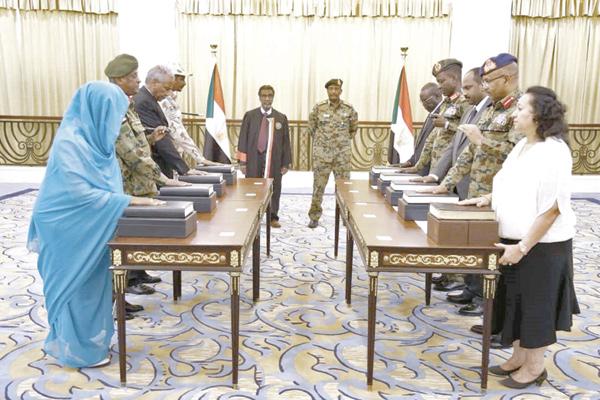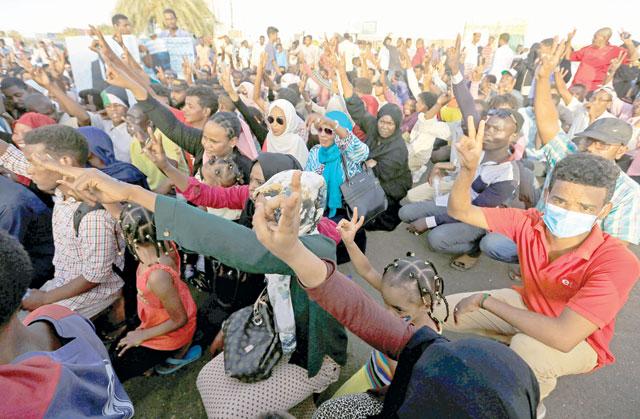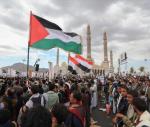You are here
Formation of Sudan's sovereign council drags on
By AFP - Aug 21,2019 - Last updated at Aug 21,2019

A Sudanese man reads the newspaper on Tuesday headlining the court appearance of Sudan's deposed military ruler Omar Al Bashir during the opening of his corruption trial the previous day (AFP photo)
KHARTOUM — Sudan's transition towards civilian rule got off to a bumpy start as generals and protest leaders fell two days behind schedule Tuesday in unveiling a joint sovereign council.
The body will replace the transitional military council that took over from longtime ruler Omar Al Bashir when he was forced from power by relentless protests in April.
The Islamist general appeared in court sitting in a cage to face graft charges Monday, a sight that the two thirds of Sudan's 40 million inhabitants who were born under his rule could hardly have imagined.
The very first steps of the transition to civilian rule after 30 years of Bashir's regime were proving difficult, however, with disagreements within the protest camp holding up the formation of Sudan's new ruling body.
The line-up was due to have been announced on Sunday, in line with a deal reached between the Transitional Military Council (TMC) and the Forces for Freedom and Change opposition coalition.
The TMC said on Monday, however, that the deadline had been pushed back 48 hours "at the request of the Forces for Freedom and Change" after they came back on some of the five names they initially put forward.
The ruling sovereign council will be composed of 11 members including six civilians and five from the military.
It will be headed by a general for the first 21 months and by a civilian for the remaining 18 months.
The roadmap drawn up by the generals and protest leaders in recent weeks set Tuesday as the date of the official appointment of a transitional prime minister.
Abdalla Hamdok, a former UN economist based in Addis Ababa, has accepted the protest camp's nomination but awaits the announcement of the sovereign council and has yet to arrive in the country.
The transition's key documents were signed on Saturday at a ceremony attended by a host of foreign dignitaries, signalling that Sudan could be on its way to shedding the pariah status the bloody war in Darfur had conferred on it in recent years.
Amidst the euphoria celebrating the promise of civilian rule, unease was palpable however within the protest camp that brought about one of the most crucial changes in Sudan’s modern history.
One of its causes is the omnipresence in the transition of Mohamed Hamdan Daglo, a paramilitary commander and one of the signatories of the documents, whose forces are blamed for the deadly repression of the protests.
Sudanese women, who played a leading role in the protests, have also expressed their shock at female under-representation in the transition.
Bashir caged
Every newspaper in Sudan made its headlines with Bashir’s landmark court appearance Tuesday.
Some of them carried pictures of the ousted ruler in his courtroom cage, an image that instantly became another symbol of his Islamist military regime’s downfall.
Large amounts of cash were found at his residence after he was toppled and police investigator Ahmed Ali said the case brought before the court concerned some of that money.
“This money was not part of the state budget and I was the one who authorised its spending,” the investigator quoted Bashir as saying.
On the streets of Khartoum, residents were not trying to hide their contentment at seeing their longtime tormentor in the dock.
“Bashir has done a lot against us in 30 years,” said Fatma Abdallah Hussein, a young medical student who took part in the protests earlier this year.
“Hunger, lack of education, what he did in Darfur and other issues, it is for these things we took to the streets, faced the teargas and the harassment,” she said.
Alhaj Adam, a Khartoum resident, argued that Bashir’s corruption trial should not distract from the need for the new administration to ratify the Rome Statute.
That would allow the former ruler’s transfer to the International Criminal Court in The Hague, where he faces charges over the war in Darfur that erupted in 2003.
“The evidence he committed genocide should come forward... Many civilians inside and outside Sudan have died because of him and he should face justice,” Adam said.
Related Articles
KHARTOUM — Sudan took further steps in its transition towards civilian rule Wednesday with the swearing in of a new sovereign council, to be
KHARTOUM — The unveiling of Sudan's sovereign council, which will govern the country's transition to civilian rule, has been postponed until
KHARTOUM — Sudan's military rulers and an opposition alliance met on Monday to discuss the powers of a joint military-civilian council to st

















